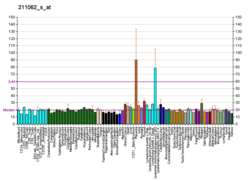| CPZ | |||||||||||||||||||||||||||||||||||||||||||||||||||
|---|---|---|---|---|---|---|---|---|---|---|---|---|---|---|---|---|---|---|---|---|---|---|---|---|---|---|---|---|---|---|---|---|---|---|---|---|---|---|---|---|---|---|---|---|---|---|---|---|---|---|---|
| Identifiers | |||||||||||||||||||||||||||||||||||||||||||||||||||
| Aliases | CPZ, carboxypeptidase Z | ||||||||||||||||||||||||||||||||||||||||||||||||||
| External IDs | OMIM: 603105; MGI: 88487; HomoloGene: 2709; GeneCards: CPZ; OMA:CPZ - orthologs | ||||||||||||||||||||||||||||||||||||||||||||||||||
| |||||||||||||||||||||||||||||||||||||||||||||||||||
| |||||||||||||||||||||||||||||||||||||||||||||||||||
| |||||||||||||||||||||||||||||||||||||||||||||||||||
| |||||||||||||||||||||||||||||||||||||||||||||||||||
| |||||||||||||||||||||||||||||||||||||||||||||||||||
| Wikidata | |||||||||||||||||||||||||||||||||||||||||||||||||||
| |||||||||||||||||||||||||||||||||||||||||||||||||||
Carboxypeptidase Z is an enzyme that in humans is encoded by the CPZ gene.
This gene encodes a member of the metallocarboxypeptidase family. This enzyme displays carboxypeptidase activity towards substrates with basic C-terminal residues. It is most active at neutral pH and is inhibited by active site-directed inhibitors of metallocarboxypeptidases. Alternative splicing in the coding region results in multiple transcript variants encoding different isoforms.
References
- ^ GRCh38: Ensembl release 89: ENSG00000109625 – Ensembl, May 2017
- ^ GRCm38: Ensembl release 89: ENSMUSG00000036596 – Ensembl, May 2017
- "Human PubMed Reference:". National Center for Biotechnology Information, U.S. National Library of Medicine.
- "Mouse PubMed Reference:". National Center for Biotechnology Information, U.S. National Library of Medicine.
- Song L, Fricker LD (May 1997). "Cloning and expression of human carboxypeptidase Z, a novel metallocarboxypeptidase". J Biol Chem. 272 (16): 10543–50. doi:10.1074/jbc.272.16.10543. PMID 9099699.
- ^ "Entrez Gene: CPZ carboxypeptidase Z".
External links
- Human CPZ genome location and CPZ gene details page in the UCSC Genome Browser.
Further reading
- Reznik SE, Fricker LD (2002). "Carboxypeptidases from A to z: implications in embryonic development and Wnt binding". Cell. Mol. Life Sci. 58 (12–13): 1790–804. doi:10.1007/PL00000819. PMC 11337317. PMID 11766880. S2CID 22530649.
- Gerhard DS, Wagner L, Feingold EA, et al. (2004). "The status, quality, and expansion of the NIH full-length cDNA project: the Mammalian Gene Collection (MGC)". Genome Res. 14 (10B): 2121–7. doi:10.1101/gr.2596504. PMC 528928. PMID 15489334.
- Ota T, Suzuki Y, Nishikawa T, et al. (2004). "Complete sequencing and characterization of 21,243 full-length human cDNAs". Nat. Genet. 36 (1): 40–5. doi:10.1038/ng1285. PMID 14702039.
- Strausberg RL, Feingold EA, Grouse LH, et al. (2003). "Generation and initial analysis of more than 15,000 full-length human and mouse cDNA sequences". Proc. Natl. Acad. Sci. U.S.A. 99 (26): 16899–903. Bibcode:2002PNAS...9916899M. doi:10.1073/pnas.242603899. PMC 139241. PMID 12477932.
- Fan X, Olson SJ, Blevins LS, et al. (2003). "Immunohistochemical localization of carboxypeptidases D, E, and Z in pituitary adenomas and normal human pituitary". J. Histochem. Cytochem. 50 (11): 1509–16. doi:10.1177/002215540205001111. PMID 12417617.
- Novikova EG, Reznik SE, Varlamov O, Fricker LD (2000). "Carboxypeptidase Z is present in the regulated secretory pathway and extracellular matrix in cultured cells and in human tissues". J. Biol. Chem. 275 (7): 4865–70. doi:10.1074/jbc.275.7.4865. PMID 10671522.
- Novikova EG, Fricker LD (1999). "Purification and characterization of human metallocarboxypeptidase Z.". Biochem. Biophys. Res. Commun. 256 (3): 564–8. doi:10.1006/bbrc.1999.0378. PMID 10080937.
This article on a gene on human chromosome 4 is a stub. You can help Misplaced Pages by expanding it. |




